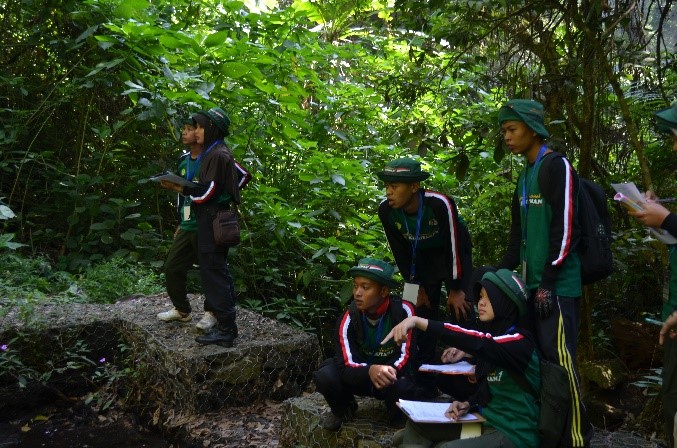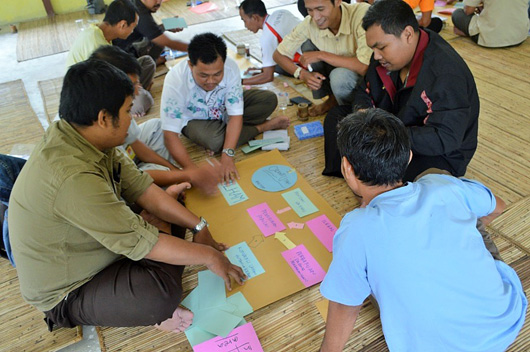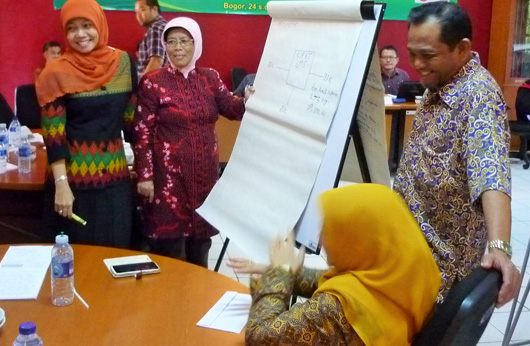FORCLIME
Forests and Climate Change ProgrammeTechnical Cooperation (TC Module)

Select your language

The Center of Training and Education for Human Resources (HR Training) of the Ministry of Environment and Forestry in collaboration with GIZ FORCLIME conducted the National Jamboree 2015 of forestry vocational (SMKK) schools with the theme "Through togetherness, let’s save the forests for the future". The main objective of this event, which took place from 17-21 August at Mount Gede Pangrango National Park, was to inspire SMKK students with the spirit of a forester and increase students’ awareness on natural resource conservation. Students were also encouraged to share their knowledge and skills on forestry related topics.
The National Jamboree was attended by 300 participants, consisting of 200 SMKK students, 40 teachers, 20 SMKK principals, 10 Japanese students, 10 students from Kornita IPB high school, as well as some government officials, private companies and academia.
Activities during the Jamboree included: (1) exhibition of forestry products made by the vocational forestry schools; (2) introduction of the National Park of Mount Gede Pangrango; (3) Competition and group exercise for awareness raising on conservation of natural resources and ecosystems (including flora and fauna inventories, or identification of ecotourism potentials); (4) performances by SMKK students such as dances and martial arts from their respective regions.
For more information, please contact:
Edy Marbyanto, Strategic Area Manager for Human Capacity Development
Th
e Center of Training and Education for Human Resources (HR Training) of the Ministry of Environment and Forestry in collaboration with GIZ FORCLIME conducted the National Jamboree 2015 of forestry vocational (SMKK) schools with the theme "Through togetherness, let’s save the forests for the future". The main objective of this event, which took place from 17-21 August at Mount Gede Pangrango National Park, was to inspire SMKK students with the spirit of a forester and increase students’ awareness on natural resource conservation. Students were also encouraged to share their knowledge and skills on forestry related topics.
The National Jamboree was attended by 300 participants, consisting of 200 SMKK students, 40 teachers, 20 SMKK principals, 10 Japanese students, 10 students from Kornita IPB high school, as well as some government officials, private companies and academia.
Activities during the Jamboree included: (1) exhibition of forestry products made by the vocational forestry schools; (2) introduction of the National Park of Mount Gede Pangrango; (3) Competition and group exercise for awareness raising on conservation of natural resources and ecosystems (including flora and fauna inventories, or identification of ecotourism potentials); (4) performances by SMKK students such as dances and martial arts from their respective regions.

The Betung Kerihun National Park (BKNP) management signed an MoU on collaborative management with the representatives of five Ketemenggungan (Dayak sub-tribe institutions) adjacent to the conservation areas to conserve the park areas and biodiversity resources. This collaboration is necessary to cope with continuous challenges faced by the national park.
In order to support capacity building of involved parties, FORCLIME facilitated a training on Participatory Conservation Planning (PCP) for technical and field staff of the BKNP, the forest management unit of Kapuas Hulu (KPH Kapuas Hulu) and Sebatopa, representatives from the five Ketemenggungan. The 37 participants are going to conduct a consultation at their respective institutions/sites following the training. For the consultation, they will apply the PCP’s 6S tool to evaluate the following aspects: System i.e. conservation targets; Stress - the condition or viability of the conservation targets; Sources being factors affecting stress for the conservation targets; Strategy - what should be done to improve or maintain the condition of the conservation targets and to eliminate threats or source of stress; Stakeholders being persons or parties who can support strategy implementation as well as conservation beneficiaries; and Success - the indicator for improved condition of the conservation target, threat elimination and capacity to implement the conservation strategy.
The results from this consultation conducted at the respective institutions/sites, are going to be presented by every training participant. By that, they will share their experiences and learn from each other with regards to applying the PCP’s 6S tool.
The BKNP manager, Arif, is very supportive of this training and the follow up planning. He expects results from the field practices will become valuable inputs for BKNP management to develop a master plan for community development. Every national park has to have a master plan for community development, including BKNP.
For further information, please contact:
Ismet Khaeruddin, strategic area manager for biodiversity conservation and protected areas
Kartika Karlina, adviser for biodiversity conservation

More than 25 government and private institutions followed the invitation to the 1st national meeting on E-learning for training institutions on 6 and 7 August 2015. The meeting was initiated by the HR Training Center of the Ministry of Environment and Forestry (CFET) and GIZ FORCLIME, targeting institutions that already use E-learning as a training method or plan to do so in future.
Speakers from the Open University, Lemhanas, Pusdiklat BPKP , the HR Training Center of Environment and Forestry, PT Telkom and the Common Sense consultancy, provided insight into their respective organisational E-Learning strategies, the workflows and curricula.
In the following discussion around challenges and opportunities for E-learning, the around 80 participants agreed: “We all are in the same boat – so let’s work together”. The most important issue identified was facing the high demand for professional human capacity development trainings in Indonesia, making E-Learning and/or Blended Learning an exceptional opportunity for training institutions. The consensus was, however, that it is also a complex task for training institutions to develop state-of-the-art E-Learning programmes and manage learning processes appropriately.
To support and improve the implementation of E-Learning programmes on a national level, it was agreed to request the help of the responsible institutions to provide:
Participants finally decided to join their forces with the foundation of a national E-Learning Network, as a forum for sharing experiences and joint activities on e-learning development.
For further information please contact:
Edy Marbyanto and Anne-Cathrin Vonarx, Strategic Area Human Capacity Development


